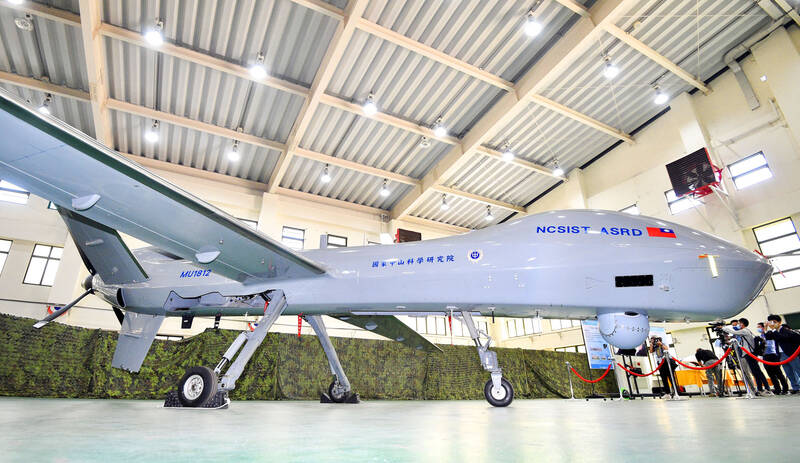The development of a fully domestic drone manufacturing supply chain is crucial to Taiwan’s ability to use the uncrewed aircraft effectively during wartime, a recent report from the Institute for National Defense and Security Research said.
Ukraine’s experience in resisting Russia’s invasion demonstrated that civilian drones can provide valuable intelligence during wartime, but they must be manufactured domestically to ensure that foreign component makers cannot take control of the devices, the report said.
In the report, institute researcher Chen Po-hung (陳柏宏) analyzed the security of Taiwan’s drone supply chain.

Photo: Lo Pei-te, Taipei Times
Ukrainians have used civilian drones to locate Russian convoys and other targets, he said, adding that drones have also helped them document battlefield conditions and gather evidence of war crimes.
“There are 78,000 civilian drones registered in Taiwan. That can definitely be a defensive advantage, but it depends on where the drones and their components are manufactured,” he said.
Citing an example of how China-made drones could be more of a bane than a boon on the battlefield, Chen said that drones made by Shenzhen DJI Sciences and Technologies Ltd and used by Ukrainian forces have allegedly been disabled by the company’s AeroScope technology.
The drones’ locations have also allegedly been shared with Russian forces to facilitate targeted bombardment of Ukrainian forces, he said.
The company has denied the allegations, saying that affected drones likely experienced signal issues, but doubts have remained, Chen said.
Taiwan’s supply chain faces several problems, such as a lack of raw materials and a small market, requiring the outsourcing of engines and other major components, he said.
“There are other challenges, like scale of production, integration capabilities and a lack of some key technologies,” Chen said. “There is a huge gap between civilian and military drones, and Taiwan is not able to compete on an international level in the drone industry, despite thriving domestic interest.”
The government must find a way to ensure that it can fully produce civilian drones locally if they are to be used in wartime, he said.
Taiwan’s state-run weapons developer last week said that it would complete the production of 104 domestically developed Chien Hsiang (劍翔) “suicide drones” by 2025.
An anti-radiation suicide drone — which targets enemy radar by detecting its electromagnetic emissions — has a maximum flight time of five hours and can strike targets 1,000km away, with an ability to target seaborne, coastal and inland Chinese radar systems, said Chi Li-ping (齊立平), head of the Chungshan Institute of Science and Technology’s Aeronautical Systems Research Division.
The institute’s Teng Yun (騰雲) drone is to enter mass production after it passes a combat readiness evaluation next year, Chi said.
The Teng Yun, which is to be used primarily for reconnaissance, comes with synthetic aperture radar and can be controlled via satellite, Chi said, adding that it has a maximum range of 1,100km and a 20-hour flight time.

A preclearance service to facilitate entry for people traveling to select airports in Japan would be available from Thursday next week to Feb. 25 at Taiwan Taoyuan International Airport, Taoyuan International Airport Corp (TIAC) said on Tuesday. The service was first made available to Taiwanese travelers throughout the winter vacation of 2024 and during the Lunar New Year holiday. In addition to flights to the Japanese cities of Hakodate, Asahikawa, Akita, Sendai, Niigata, Okayama, Takamatsu, Kumamoto and Kagoshima, the service would be available to travelers to Kobe and Oita. The service can be accessed by passengers of 15 flight routes operated by

Chinese spouse and influencer Guan Guan’s (關關) residency permit has been revoked for repeatedly posting pro-China videos that threaten national security, the National Immigration Agency confirmed today. Guan Guan has said many controversial statements in her videos posted to Douyin (抖音), including “the red flag will soon be painted all over Taiwan” and “Taiwan is an inseparable part of China,” and expressing hope for expedited reunification. The agency last year received multiple reports alleging that Guan Guan had advocated for armed reunification. After verifying the reports, the agency last month issued a notice requiring her to appear and explain her actions. Guan

GIVE AND TAKE: Blood demand continues to rise each year, while fewer young donors are available due to the nation’s falling birthrate, a doctor said Blood donors can redeem points earned from donations to obtain limited edition Formosan black bear travel mugs, the Kaohsiung Blood Center said yesterday, as it announced a goal of stocking 20,000 units of blood prior to the Lunar New Year. The last month of the lunar year is National Blood Donation Month, when local centers seek to stockpile blood for use during the Lunar New Year holiday. The blood demand in southern Taiwan — including Tainan and Kaohsiung, as well as Chiayi, Pingtung, Penghu and Taitung counties — is about 2,000 units per day, the center said. The donation campaign aims to boost

The Central Weather Administration (CWA) said a magnitude 4.9 earthquake that struck off the coast of eastern Taiwan yesterday was an independent event and part of a stress-adjustment process. The earthquake occurred at 4:47pm, with its epicenter at sea about 45.4km south of Yilan County Hall at a depth of 5.9km, the CWA said. The quake's intensity, which gauges the actual effects of a temblor, was highest in several townships in Yilan and neighboring Hualien County, where it measured 4 on Taiwan's seven-tier intensity scale, the CWA said. Lin Po-yu (林柏佑), a division chief at the CWA's Seismological Center, told a news conference